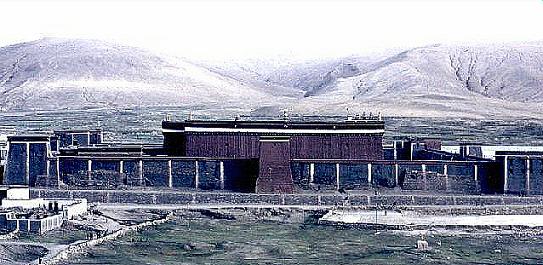Sakya Monastery: Difference between revisions
Jump to navigation
Jump to search
mNo edit summary |
No edit summary |
||
| Line 1: | Line 1: | ||
[[Image:Sakya Monastery Tibet.JPG|frame| | [[Image:Sakya Monastery Tibet.JPG|frame|Sakya Monastery in Tibet]] | ||
'''Sakya Monastery''' | '''Sakya Monastery''' ([[Wyl.]] ''sa skya dgon pa'') is the head monastery of the [[Sakya]] school, located in [[Tsang]] province in Central Tibet, founded by [[Khön Könchok Gyalpo]] in 1073. It is named after the white-coloured or pale (''skya'') earth (''sa''). | ||
==Three Special Qualities== | ==Three Special Qualities== | ||
Revision as of 12:52, 22 November 2010

Sakya Monastery (Wyl. sa skya dgon pa) is the head monastery of the Sakya school, located in Tsang province in Central Tibet, founded by Khön Könchok Gyalpo in 1073. It is named after the white-coloured or pale (skya) earth (sa).
Three Special Qualities
- It was prophesied by Guru Rinpoche that a monastery would be built in this location and that it would bring benefit to the teachings and beings. He blessed the land and built a stupa in each direction.
- Glorious Atisha, when he passed through this place, saw two wild yaks grazing on the mountainside, and calling out. He said that in the future there would be a great monastery there, and that it would have two Mahakala protectors. He performed prostrations and made offerings. In the white earth he saw seven dhīḥ syllables, one hrīḥ and one hūṃ. These were signs that there would appear seven emanations of Manjushri, one of Avalokiteshvara and one of Vajrapani.
- Sachen Kunga Nyingpo received the Lamdré teachings from his main guru and was told not to reveal them to others or to write them down for eighteen years. Before this time had passed however, he fell sick, and forgot some of the teachings he had received. He prayed to his guru who then appeared to him in a dream and gave him teachings. He continued to pray, and this time his guru appeared in person and gave further teachings. Still, he continued to pray, and finally the great Virupa himself appeared on the mountain, and proclaimed, "This land belongs to me."